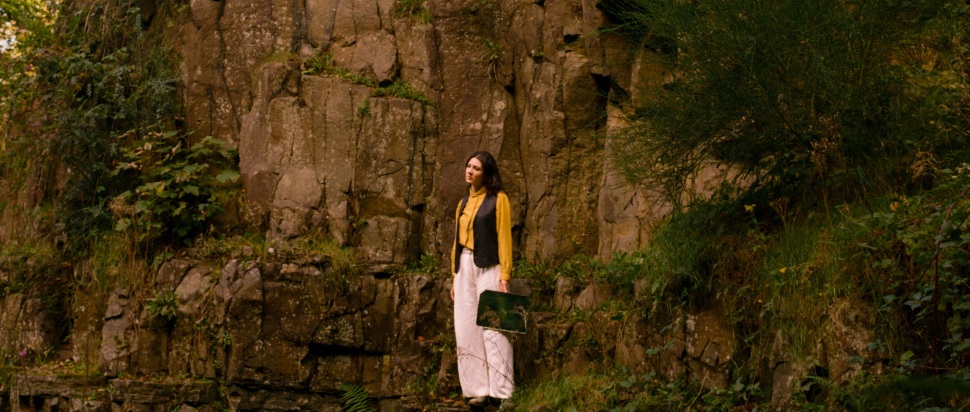Raveloe on new album Exit Light
Ahead of releasing her debut album, Exit Light, we chat with Glasgow singer-songwriter Kim Grant, aka Raveloe
Margaret Gallagher lives in a cottage in County Fermanagh, Northern Ireland. There’s no electricity, no internet, no running water. Eighty-one years ago, she was born there and, to this day, there she remains. She lights fires to cook, is active in her local community, and continues to live according to the knowledge and traditions handed down to her in the 40s and 50s. She is content. “It’s shaky at the minute, but then so am I,” she told a reporter earlier this year, “so we’ll have a battle out to see which of us goes first.”
Gallagher’s way of life presents the dichotomy of human beings’ relationship with nature, how we can be at odds or at one with it, and how we came from it and can choose to return. Gallagher’s story struck a chord with Glasgow-based songwriter Kim Grant, who makes music as Raveloe, a reference to George Eliot’s Silas Marner, and a call to weave music and words into indelible impressions of moments and feelings.
“I was fascinated by her resourcefulness and independence,” says Grant. “She survived her environment and is still going. In her house, everything has a purpose – it isn’t a museum. It was a refreshing, minimalist way to live.”
Grant stumbled upon a documentary about Gallagher after falling down a YouTube rabbit hole about slow living (“people chopping logs and building their own houses”). Eventually, it became the inspiration for the centrepiece of her debut album, Exit Light. Clouds Are Release is a rollicking ode to Gallagher’s ability to adapt, even in the face of ominous weather. 'There is a grace in every line on her face', sings Grant. 'The clouds are coming, so I learn to read them'.
Clouds Are Release alone is a thrilling step forward for Grant. Originally a home recording artist, to great effect on 2021 EP notes and dreams, here she plays with tempo, loud/quiet dynamics, and the kind of communal atmosphere perfected by bands like Big Thief – the playing has an organic, and even telekinetic, sense of oneness, helped by the presence of Scottish music mainstays Susan Bear, Simon Lidell, and others. Elsewhere, field recordings, strains of Celtic folk, and Grant’s suspended vocals add to Exit Light’s ability to balance otherworldliness with something more grounded.
“I love contrast, and distorted textures are an element I’m drawn to in my own listening,” says Grant of this growth, citing The Microphones and Phil Elverum’s way of “oscillating between intimate and big, textural sounds. That’s come by inviting a bit more collaboration, and playing live in the studio with a band, capturing an energy I wasn’t quite able to from home.”
Grant says she fell into songwriting “because it was a visceral way to place my emotions. I can still remember one of the first songs I wrote, when I was 11 or 12, I remember this feeling of isolation, and putting it down to a melody was very cathartic and soothing. And I think that's where my relationship with making music started. From then on, I kept writing, bits of poetry or short stories but also thinking of melodies, even though I couldn’t play any instruments at that point. It’s a little bit of magic. I’ll sing a line to a certain harmony, and that can be a really intense feeling.”
On Exit Light, nature can be a refuge, and have a mysticism and wonder, a “rustle in the leaves” that defies explanation, which manifests in the magical realist slant of some of Grant’s lyrics. She admits there’s a sense of romanticising of rural habitats, something she was bound to do growing up in an urban centre like Motherwell, and living in one now. But there’s also a grappling with understanding it: Grant references the ways natural phenomena seem to mimic human behaviour, relationships, or systems. These songs don’t provide any answers or doctrine necessarily, but are a document of an artist contending with these themes and cultivating a connection with their surroundings.
“When I was growing up, I remember walks by the River Avon in Hamilton, and whenever I was in green spaces, forests, or just our own garden, I would feel this sense of awe and bewilderment,” says Grant. “There’s this kinship between us and the natural world, and I wanted to touch on the escapism in it, but also the reflection of us in it, and it in us.”
On the album cover, Grant is depicted at Govan Docks sitting embedded amongst the reeds, a housing estate visible in the background. “We saw the brush in this disused area, and it encapsulated the duality of the record: this magical space that you can’t quite place, and then something that’s very grounding.”
Grant skateboards, and says it taught her a lot about commitment and being open to vulnerability. While that practice may seem perpendicular to her contemplative songwriting, it showcases a less outgoing part of Grant’s personality as an artist: a propulsive willingness to move forward, something the evolution represented by Exit Light encapsulates.
Exit Light is released on 11 Nov via Olive Grove Records
